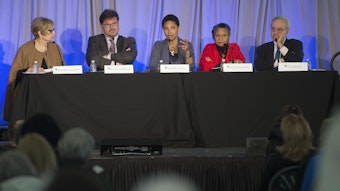Radcliffe Day 2017

Radcliffe Day 2017 united voices from the right and the left, the newsroom and the classroom, to explore the role of a free press in a democracy.
WITH ITS CONTINUOUS drizzle and chilly temperatures, Radcliffe Day 2017 was more like March than May, but that did not deter the registered audience from showing up for a spirited conversation about the current state of journalism in the United States.
After framing remarks by Dean Lizabeth Cohen—during which she highlighted the proliferation of new media sources and decried the divide-and-conquer tactics of television news programs that seek to confirm biases rather than to inform consumers—the New York Times columnist, author, and commentator David Brooks warmed up the crowd with humorous remarks about his chosen line of work. He also gave his personal perspective on Gwen Ifill and Judy Woodruff—honored later, at the lunch, with Radcliffe Medals—whom he praised for their consistency over time.
Ann Marie Lipinski, a Pulitzer Prize winner and the curator of the Nieman Foundation at Harvard, paraphrased Harvard President Drew Gilpin Faust, pointing out that the issues currently faced by the media are the same currently faced by academia, “certainly here at Harvard, where the motto is Veritas.” Jonah Goldberg—a senior editor at National Review, a nationally syndicated columnist, a best-selling author, and a fellow of the National Review Institute—made the point that ideas matter and stressed the importance of argument, reason, and “marshaling facts and logic to make an argument—because that’s what democracy is about.” Lest we think that the current mistrust of the media is unique to the Trump era, Danielle Allen PhD ’01 gave the historical perspective. The James Bryant Conant University Professor and the director of the Edmond J. Safra Center for Ethics at Harvard, Allen looked back at the late 1930s, when Father Coughlin’s radio show was stirring up anti-Semitic sentiment.
E. J. Dionne ’73, who frequently comments on politics in the media, is a columnist for the Washington Post, a senior fellow in governance studies at the Brookings Institution, and a professor at Georgetown University’s McCourt School of Public Policy. He defended the role of responsible opinion journalism in today’s media environment: “Opinion journalism that is not based on fact is not journalism.” Of course, he pointed out, “technology makes everything more efficient, which includes both the spreading of truth and the spreading of lies.”
A’Lelia Bundles ’74, a writer who worked as a television news executive for 30 years, offered a glimmer of hope: “Liars get cocky. Liars miscalculate. Lies backfire.” For this reason, she said, “When we hear a lie, we must challenge it.”
Gwen Ifill and Judy Woodruff: Coanchors for the Ages
Both members of the well known duo—who moderated presidential debates, interviewed world leaders, and reported the most important stories of the day—had bumpy starts to their careers.
Dean Cohen told the story of Ifill’s finding a racist, threatening note on her desk when she was interning at the Boston Herald at the height of the Boston busing crisis of the 1970s. But after Ifill graduated from Simmons College, she was undeterred from taking a job at the Herald. Cohen quoted Ifill, “‘I knew if I got my foot in the door, I could do it.’”
Woodruff began her career in local television in Georgia, where she was told by one station, “We already have a woman reporter.” Like Ifill, she persisted. Before presenting Radcliffe Medals to Woodruff and the late Ifill, whose medal was accepted by her friend Michele Norris, Cohen welcomed the acclaimed biographer Walter Isaacson ’74, who interviewed Woodruff. The two women were named coanchors of PBS NewsHour in 2013. Woodruff said that she and Ifill viewed their role there as “the custodians of something that had been handed to us—what Robert MacNeil and Jim Lehrer started in 1975 after the Watergate hearings, [when] they came together to start the MacNeil Lehrer Report. The kind of journalism they believed in is the kind of journalism we believed in . . . bringing light and not heat.”
Woodruff emphasized that journalism needs young people with a diversity of backgrounds. “Jump in,” she said. “The water’s great. We need you.”








